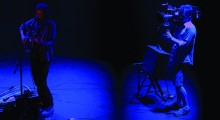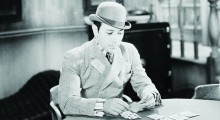Issues
-
The Union Between DPs and Operators

“And that’s when he started yelling into the phone. No, no, no!” My agent laughed a little bit as he retold the story. The union rep was on the other end of the line, and he wasn’t very happy. “Apparently I was the third person to call him about it,” he said. It was three days before principal photography was slated to begin on my current project, and IA600 had made it painfully clear that there was no way they were letting me touch the camera. For many of us indie DPs, there has never been a delineation between shooting […]
-
Super 8: Class Action

Fox 100th By the time you read this, Fox will be well underway with its “Fox 100th” initiative. To commemorate its 100 years, 20th Century Fox is making 100 of its films available for digital rental (and, in many cases, purchase) in HD. Taking a deep approach to its catalogue rather than focusing on the most obvious titles, the Fox 100 body of titles is overwhelmingly slanted to films made before 1950. Some of these have never been available on home video before, like Raoul Walsh’s vibrantly racist, rowdy and essential 1933 pre-Code drama The Bowery; classic film buffs will […]
-
Teaching Virtual Reality

Last year’s New Frontier section of the Sundance Film Festival included 11 virtual reality projects, helping sanction a technology that, like 3-D, has come and gone several times in the past but suddenly seems to be everywhere. Filmmakers, game designers, media artists and storytellers of all kinds are exploring a new language of story experience, while culturally, pundits are pondering the benefits, and problems, of VR, as evidenced in Maria Konnikova’s “Virtual Reality Gets Real” piece in the October 2015 issue of The Atlantic. Last April, The New York Times Magazine took things a step further with a cover for […]
-
Blood, Simple

Creative freedom can be a real motherfucker. As anyone who has tried to make something — a story, a poem, a painting, a movie — can attest, the mantra “go ahead, make whatever you want” can lead to paralysis when it comes to actually creating something of distinction. Having unlimited creative options is like having none. There’s a long and rich history in cinema of self-conscious efforts to impose strictures on the filmmaking process, whether it be the Dogme 95 movement, the single-take technique (Victoria, directed by Sebastian Schipper, is a recent example), or the structural limitations imposed by the […]
-
Carol Sound Designer Leslie Shatz

It’s the middle of the week and I’m walking with sound designer Leslie Shatz from 34th Street toward Times Square. Manhattan’s mayhem is a fusion of random crowds and even more random noises. Leslie abruptly asks me to keep quiet for a few moments while he takes out his phone and starts recording the sounds of the street. I realize that he is in search of new ideas. “You can shut your eyes, but you cannot shut your ears,” he says. “Sound is always a tool you can use in interesting and different ways.” Sound designer Leslie Shatz, winner of a rare […]
-
Hell on Earth: László Nemes on Son of Saul

László Nemes’s debut feature Son of Saul was awarded the Grand Prix at Cannes this year. Taking place over a 36-hour-period at Auschwitz in 1944, the film tells the story of Saul, a member of the “Sonderkommandos,” the Jews forced to handle the dead bodies in the crematorium. When Saul sees the body of a boy he believes to be his son, he goes on an impossible mission to try to save the body from the flames and find a rabbi who can recite the Kaddish to give the boy a proper burial. Saul risks everything and stops at nothing, […]
-
Is TV Killing Indie Film?

Is TV usurping independent film? That was one of the main takeaways in a recent Filmmaker Magazine article written by producer Mike S. Ryan (“TV is Not the New Film”). With veteran producers, writers and directors heading to HBO, Netflix and Amazon in droves; with audiences affixed to the latest show recaps; and with film festival programmers dedicating more slots to episodic storytelling, it sure seems so. But if you talk to working indie-film professionals, the question appears to be slightly off the mark. Maybe we shouldn’t be asking whether long-form storytelling is supplanting indie film, but how it’s enabling […]
-
How to Deliver Your Film to a Festival

Note (May 2018): the updated version of this article can be found here. Format. Codec. Audio. DCP. You’ve worked on your movie now for some time and have been eagerly waiting for acceptance emails from festivals. One lands in your inbox, and you excitedly read through the letter until, when you get to the festival’s technical requirements, you develop a sense of dread. The tersely worded communication from the technical director (glad we could finally meet) would put you to sleep if it didn’t terrify you. But don’t panic. Instead, phone your editor, and read this guide. Caveat emptor, though: […]
-
Pacing Myself: Henry Gamble’s Birthday Party Director Stephen Cone on Being His Own Editor

“Don’t you ever want an objective pair of eyes?” “Have you ever thought about working with an editor?” “Yes” and “yes” are the answers to questions asked of me and other filmmaker/editors over the years about this dual position, which, for either budgetary or artistic reasons, usually extends into self-music and postproduction supervision. Much like that against playwrights directing their own work, there is often a stigma against directors editing their own films, even as, in our ever-overcrowded filmmaking landscape, there are inevitably more filmmaker/editors, each with a mindset and motive different from the next. For some, it’s an easily […]
-
Dark in the Daytime

Blue City The 1986 release Blue City might not be one of the best movies Walter Hill ever had his name on, but it’s certainly one of the most fascinating from an auteurist standpoint, despite the fact that Hill isn’t even its auteur. That credit goes to Michelle Manning, who got the job while still in her mid-20s after her former boss, Ned Tanen, took over as head of Paramount. Manning’s early career trajectory was swift: fresh out of University of Southern California film school, she rose from Zoetrope production assistant to a position as Tanen’s associate producer on a […]
